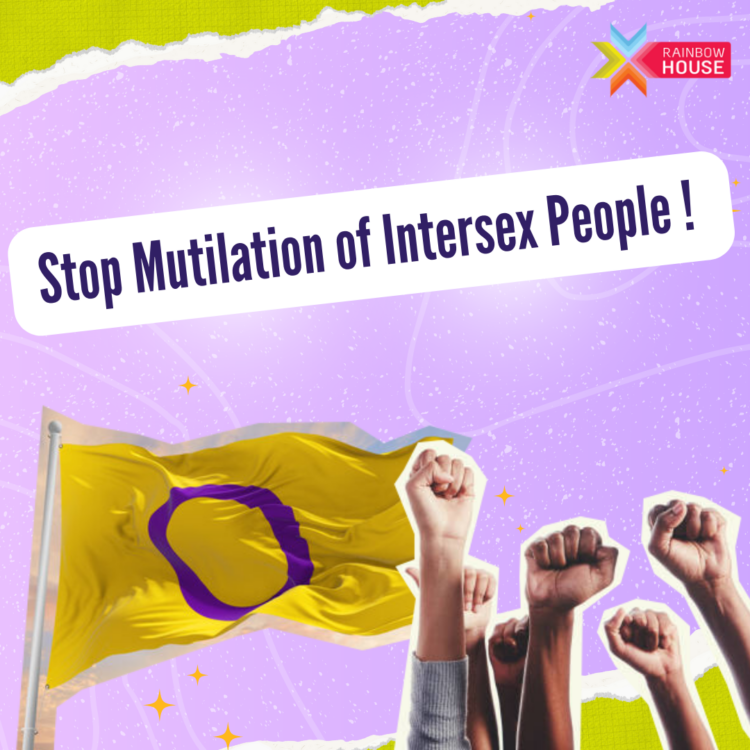In the picture

Patients’ Rights Day: Stop the mutilation of intersex people!
published on 17 April 2023
On the occasion of the International Patients’ Rights Day on April 18, RainbowHouse Brussels, çavaria, Prisme, Genres Pluriels, Intersekse Vlaanderen and Intersex Belgium co-sign a press release on the subject of mutilations of intersex people.
We want to denounce with one voice the legal inadequacy of these people, often very young, who undergo heavy surgical treatments with the only aim of making them correspond to social norms.
We demand:
The effective application of the patient’s rights to all people regardless of their gender characteristics.
A law to stop unnecessary surgeries on intersex minors, and for this, that the measure of informed consent be strict and detailed.
We also insist on the need for extensive medical training on the rights of intersex people in collaboration with the people concerned, as well as the establishment of strict and independent controls.
Full Press Release :
In February 2021 the House of Representatives unanimously passed a resolution to ban unnecessary surgery on intersex minors.
In February 2023, the Queen Fabiola Children’s Hospital in Brussels was condemned by the Court of Appeal for performing mutilating and discriminatory medical treatments on an intersex minor.
On 18 April, we celebrate European Patients’ Rights Day. This is an opportunity for our organisations to draw attention to the surgical mutilations still performed on intersex people and to denounce the inadequacy of the legal framework in Belgium to prevent these harmful and damaging practices.
Intersex people are born with variations in gender characteristics that do not correspond to the binary norm, as medically and socially described, of male or female bodies.
Although the Belgian constitution guarantees the right of every person to physical integrity and since 2002 there has been a law enshrining the rights of the patient, intersex children still too often undergo major surgery to modify some of their gendered characteristics. With very few exceptions, intersex does not pose a risk to physical or psychological health. These operations are therefore absolutely not necessary for the child’s development, health, future intimate life or fertility. Their sole purpose is to make the child fit into a binary, heteronormative social norm, divided into male and female.
“We are told “if you are not a girl or a boy then what are you? In fact, in the eyes of society, to be a boy, you have to be able to penetrate and pee standing up, to be a girl, you have to be penetrable. Full stop. We pathologise a social discriminatory risk to invisibilise the existence of intersex people who would challenge the binary rigidity, yet intersex people are there and have the right to exist as they are without being discriminated against. Social invisibilisation must stop.
(Sylviane, Intersex Belgium)
In addition to being mutilations with disastrous and painful consequences on the adult life of the children who have undergone them, these operations lead to serious violence (vaginal touching, insertion of anal probes to check erectile capacity, enlargement of vaginal walls, etc.). As a result, they cause psychological trauma as well as physical damage that is often irreversible. They also contribute to ignoring all the other pathologies from which intersex people may suffer.
“As soon as an intersex person speaks openly, traumatic experiences are minimised, denied and filed away as medical errors. I, for example, would have liked to have my hip or my teeth taken care of, but instead I am told what to do with my sex or my beard. In fact, as the focus is on our reproductive system and the social norm it should correspond to, our humanity is denied and we are completely forgotten.
(Sylviane, Intersex Belgium)
We claim that the current legislation is not sufficient and does not protect the physical integrity of intersex people. The prior, explicit, free and informed consent required to carry out an intervention on an intersex person is made impossible by the pressure to normalise and the lack of scientific knowledge about intersex within the medical sector.
When children are operated on at a young age, it is obvious that consent cannot be present. The medical authority then uses a questionable lever by playing on the sensitivities of parents who are often ill-informed, which takes away a large part of their free will and their capacity for judgement.
When intersex people reach adolescence, the medical profession sometimes entertains unfounded fears about the risks of cancer and infertility. Again, in the face of authority, some teenagers “agree” to surgery. This notion of consent is, in our view, far too influenced to be called informed.
Today, we are calling for the effective application of patients’ rights to all people regardless of their gender characteristics.
We call for a law to stop unnecessary surgery on intersex minors and for the informed consent measure to be strict and detailed.
We also insist on the need for extensive medical training on the rights of intersex people in collaboration with the people concerned, as well as the establishment of strict and independent controls.
